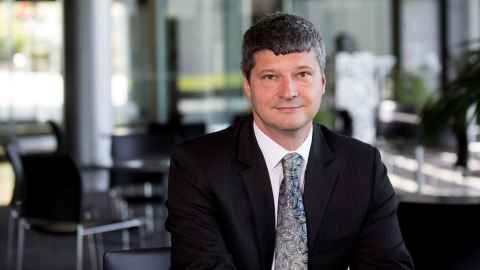How to prepare yourself for the future of work
22 May 2018
Opinion: Vaughan Yarwood (Business School) reports on issues around AI and the changing workplace highlighted in a video featuring Professor Rod McNaughton on Newsroom.

There is a lot of talk these days about the growing threat to jobs posed by artificial intelligence (AI) and robotics. And with each technological advance the range of work falling under the shadow of machines seems to grow. But our most pressing challenge is neither to safeguard existing jobs nor to create new ones, says Rod McNaughton. It is to manage the transition between the two.
"This fear of technologically-induced unemployment has been with us for hundreds of years," says Professor McNaughton, Deputy Dean of the Business School.
"The Industrial Revolution replaced physical labour with machinery and in the process displaced millions of workers. Yet, because of the growth unleashed by that revolution, today there are literally hundreds of millions more people employed than there were before it started."
Today, says McNaughton, the primary challenge is to prepare young people for jobs that do not yet exist, and to assist those whose jobs are disrupted to transition into new fields of work.
To do this effectively we must, above all, think differently about change itself, he says.
"Rather than focusing on 'disruption', we should appreciate that change is a natural and desirable state. And, both individually and as a society, we should be prepared to adapt and respond quickly to social and economic transformations."
Educators have a fundamental role to play in this process, says McNaughton.
"Universities still largely focus on knowledge that is organised within disciplines. But knowledge in and of itself is no longer a key source of advantage."
Rather, he says, jobs of the future will require capabilities that are innately human, such as judgemnt, decision-making, emotional intelligence, and cultural awareness.
The Business School is helping students prepare for this uncertain future by shifting from a traditional focus on imparting knowledge to helping students develop such foundational skills.
Recognising that digital fluency will be essential to all new jobs, the School is also adapting its curricula to include data analytics, digital marketing and communications, and social media, along with a growing emphasis on change management, and innovation and entrepreneurship.
In addition, it is strengthening engagement with students outside the classroom, and encouraging them to collaborate entrepreneurially with firms. Recently, for example, the Business School-hosted Centre for Innovation and Entrepreneurship, opened a new maker-space on campus in collaboration with the Faculty of Engineering to foster creativity and collaboration among University of Auckland students, staff, and businesses.
However, preparing for the future of work is not a task for schools and universities alone, says McNaughton. We all bear responsibility for developing ourselves to be resilient in the face of change.
"Employers must rethink the way they hire, retrain, and shape their workforces. And government needs to put in place sound policies to help young people prepare for the future of work, assist those whose jobs are disrupted to transition to new types of work, and blunt the social and economic impacts of rapid change."
McNaughton advises that to future-proof themselves, individuals should:
- Alter their thinking. The job requirements of tomorrow are unknowable, so people should stop thinking in terms of job-specific skills, and instead foster foundational skills that enable resilience, and a fast, positive response to change.
- Embrace the reality that they will likely pivot between roles that are outwardly very different, but which are underpinned by these same foundational skills.
- Stop thinking of education as something that ends in their 20s with the transition to the workplace. Education and work will become more closely entwined in a lifelong process of deepening foundational skills, while adding new experiences and technical skills to stay abreast of evolving job requirements.
Vaughan Yarwood is editor of the University of Auckland Business School's Knowledge website.
This article reflects the opinion of the author and not the views of the University of Auckland.
Republished with permission from Newsroom, How to prepare yourself for the future of work published on Tuesday 17 July 2018.